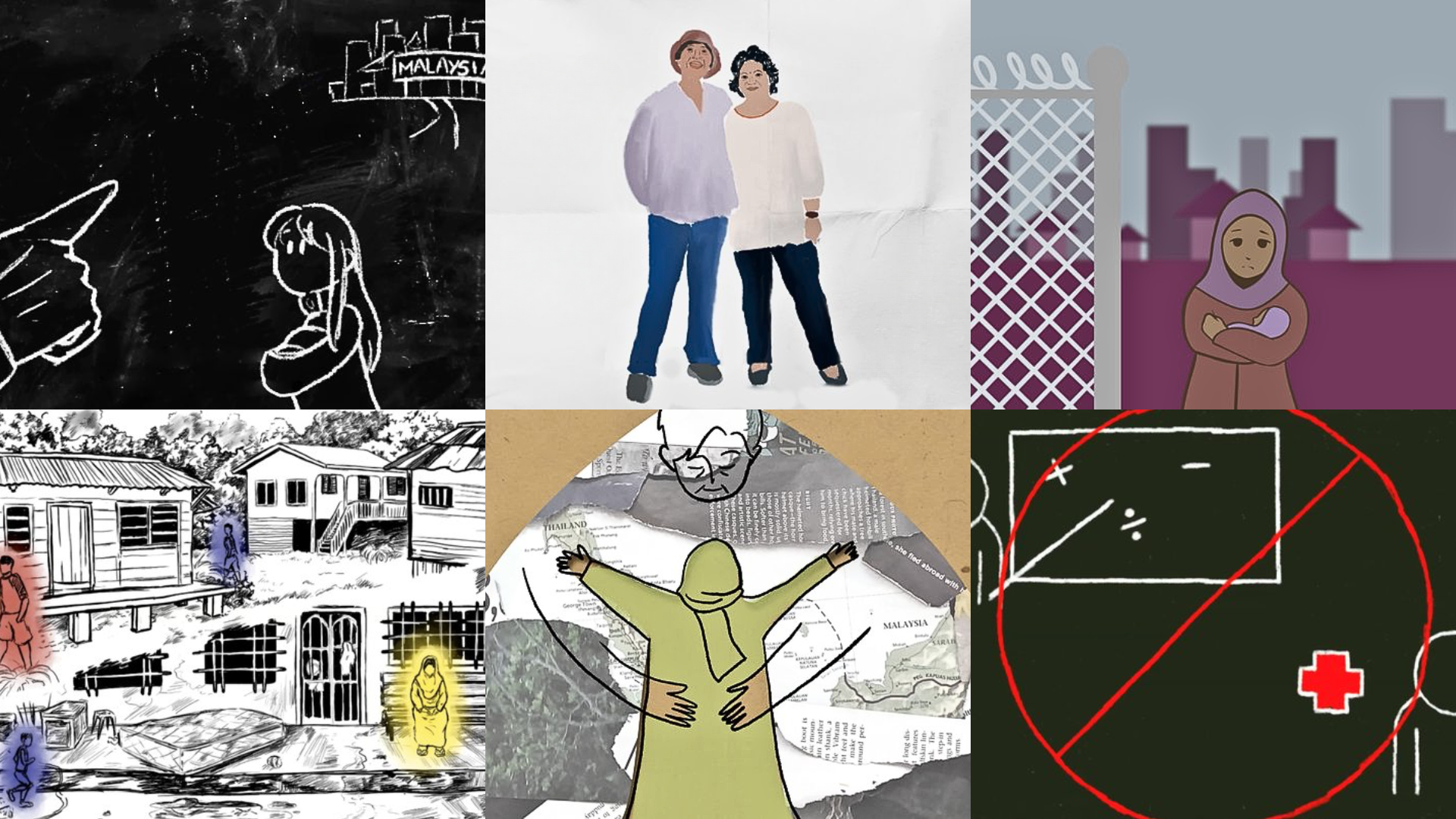(In)Visible People: Seeing Malaysia’s Stateless Communities

By Nadira Ilana | 10/13/2025
While the COVID-19 pandemic threw the world into lockdown, two Malaysian film students bound in their Selangor homes were tirelessly recording interviews and talking to animators remotely for a project to raise awareness about an issue that bewildered them both. Director Jean Ho was studying Cinematography and Screenwriting at DePaul University in Chicago, and her producer, Ng Li Wei, was pursuing Film Production at California State University, Northridge. Neither had experience in nonfiction filmmaking, but both found passion in an issue they were determined to see more of in Malaysia's mainstream discourse: statelessness. What started as a seed of curiosity led to Invisible People, a six-part animated documentary series humanising the struggles of Malaysia's stateless and refugee communities.
Statelessness in Malaysia is hardly a marginal issue; it is widespread and deeply entrenched. According to the UNHCR (United Nations High Commissioner for Refugees), the country has the third-largest reported stateless population in Southeast Asia, with 117,070 individuals at the end of 2023. Of these, over 107,000 are Rohingya refugees. The picture in East Malaysia is even more complex. The status of undocumented migrants in the Malaysian Borneo territory of Sabah is highly enmeshed, marked by different waves and generations of migration - namely, political refugees and "Project Mahathir," where thousands of irregular migrants were illegally provided documents to become voters. In Sabah, one in three people lacks a proper legal identity, amounting to nearly a million undocumented individuals - among them, an estimated 50,000 are children. Statelessness does not only impact refugees and migrants; thousands of rural Indigenous people and children of mixed parentage are also trapped in an intergenerational cycle of poverty and social marginalisation.
Invisible People highlights several variables in Malaysia that can easily render a person stateless or a refugee, leading to devastating consequences. "These are the systemic failures we wanted to shine a light on," says Jean.
Episode 1: Adria and Rishon Elwell
Adria only discovered after her son was born in Sri Lanka that he could not inherit her citizenship due to a law that prejudices children born to Malaysian women abroad.
Episode 2: Dr. Tamara Joan Duraisingam
Dr. Tamara Joan Duraisingam, a Senior Lecturer in the Business School at Sunway University Malaysia, breaks down issues concerning statelessness, refugees and citizenship in Malaysia.
Episode 3: Tawk Lian Sang (Peter)
Peter Tawk is a Chin refugee from Myanmar in Malaysia whose passion for his people led him to run a non-profit school for child refugees.
Episode 4: Maalini Ramalo
On the NGO front, Maalini Ramalo is the Director and leader of the Statelessness Unit at the Social Protection of Development of Human Resources in Rural Areas (DHRRA) Malaysia.
Episode 5: Chee Yoke Ling
Lawyer Chee Yoke Ling is a Committee Member of Family Frontiers Malaysia, a non-profit organisation challenging an outdated Federal Government citizenship law that discriminates against children born to Malaysian mothers overseas.
Episode 6: Rohana Abdullah
Rohana's Malaysian father left her at birth, forcing her Indonesian mother to leave her with a guardian - a Chinese teacher, Chee Hoi Lan. Their cross-cultural relationship went viral in 2022, and Rohana has since gotten her citizenship, but not without putting up a fight.
Without documentation, these individuals are barred from public education, affordable healthcare, formal employment, and sometimes even freedom of movement. Statelessness means being excluded from basic opportunities and living in constant fear of exploitation or detention. Statelessness can mean having to endure life with a thousand cuts.
At the end of 2024, Malaysia passed constitutional amendments correcting gender-discriminatory measures. Children born overseas to Malaysian fathers and mothers are now entitled to inherit their citizenship. However, the law is still pending full implementation, royal assent, and gazetting. Other amendments remain regressive, introducing measures that may increase statelessness and further harm children, especially those from minority and vulnerable communities.
What started as a lockdown project by two young filmmakers has grown into an urgent call to action in the service of stateless individuals.
"The harsh reality is that our citizenship status can be jeopardised at any time. Being stateless or a refugee is not a choice. These are unfortunate outcomes borne out of systemic failures against fellow human beings," Jean emphasised. "It is time for us to stop overlooking their existence and experiences. It is time their stories and voices are heard."
In June 2025, Invisible People premiered at Sunway University in Kuala Lumpur, organised in partnership with Amnesty International Malaysia, Family Frontiers, Social Protection of Development of Human Resources in Rural Areas (DHRRA) Malaysia, and Fugee.
Watch the Invisible Playlist Playlist →